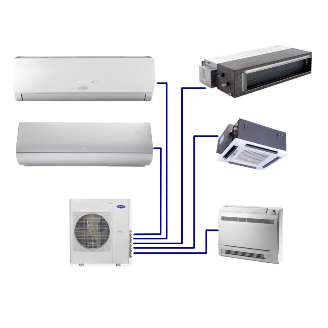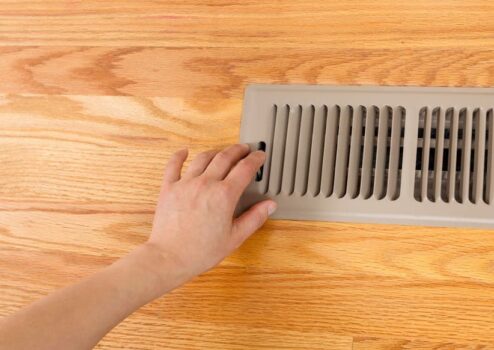I didn’t grow up around HVAC professionals, nor was I one of them. As a child, I remember a common practice was people closing air vents in unused rooms to save money on their electric bill (or gas bill). This always seemed to make sense to me from a common sense perspective. But, does closing off the vents in unused rooms actually help save energy and money? Can closing the vents actually cause problems with the HVAC unit?
In this post I will be answering these questions along with other related questions!
Let’s get to the first question….
Does Closing Vents in Unused Rooms Save Money?
In short, no. Closing air vents in unused rooms actually does not save energy or money. Yes, by closing a vent, air is no longer distributed to that specific area, but that’s likely not what your installed system was designed to do.
By closing off vents, the pressure inside of the ducts is increased which restricts air flow. This causes the system to work harder as it tries to distribute this air to the targeted areas. The same amount of air is being blown through the duct work as before, but with less open airways to escape. So, the heating and/or cooling unit is working harder to distribute this same amount of air than it was previously.
This can actually cause your energy bill to rise rather than to decrease.
Is Closing Vents in Unused Rooms Bad?
Yes, because of the damage and problems it can cause with your HVAC unit. Closing off air vents, as I mentioned earlier, increases the air pressure in the system’s duct work. It creates more pressure than the system is designed to handle, in most cases. This can lead to numerous problems.
1 ) Increased pressure can cause leaks in the duct work, which will decrease the efficiency of the HVAC system.
2 ) Depending on the type of blower your system uses, the blower can be affected in 2 different ways: the blower will slow down and produce less air which will cause the cooling or heating process to take longer. The blower will work harder to overcome the extra pressure in the system which requires more energy. Both of these situations cause the blower to work harder than it should, thus increasing the likelihood of malfunction or breakdown.
3 ) If the blower slows down and produces less air in the system than what is optimal, a couple of components can be affected: the evaporator coil can freeze over if it is not receiving the proper amount of air flow. The evaporator coil needs a constant and proper amount of air flow over it to keep it from getting too cold. The heat exchanger (in a furnace) can actually overheat without the proper amount of airflow. This can cause the heat exchanger to crack. Heat exchangers can be one of the most expensive furnace repair jobs out there. Other components, such as the system’s compressor, can also be negatively affected as well.
Related: Replace Heat Exchanger or Buy New Furnace
Related: Cracked Heat Exchanger: Symptoms and Causes
What About Partially Closing the Vents?
Partially closing air vents is a better alternative than completely shutting them. An example of this would be partially closing the vents in the Winter in the upstairs portion of a multi-level home or building. Since heat rises, partially closing the upper level’s vents allows more heat to be dispersed on the lower level. This should keep it more balanced temperature wise with the upper level.
During the warmer weather months this process can be reversed: the lower level’s vents will be partially closed while the upper level’s are wide open.
The Most Effective Solution
The idea of closing off vents in unused rooms is a good idea and there is actually a heating and air system that is capable of having this same affect. A multi-zoned system with modulating blower operation and variable speed airflow can provide this ability. These heating and air systems provide a large increase in efficiency by only running the blower at the speed and power that it needs to at a given time, based on the demand. The multi-zone feature allows each zone (level or room) to be specifically targeted at a particular temperature. So, if there is a room or rooms that you don’t want to waste air flow in, you have the option of not sending air to that zone. The dampers inside the ductwork, along with a bypass duct, provide this ability by safely regulating the airflow to each zone.

Ductless mini split systems are also another option. These systems are ductless and are the most efficient option because of that. They don’t lose any air! These systems are also multi-zone capable as well. These systems contain a condenser unit outside that connects to one or more evaporator units inside. Each room can have it’s own evaporator unit and thermostat allowing complete control of the temperature in each room.
Don’t want to run air into a certain room? Simply turn off the thermostat in that room/zone.
Say No to Closing Vents
Whether it’s closing vents in the Summer or closing the vents in the Winter, it’s just not the best idea. So, the next time you think or someone asks Should I close vents in unused rooms?, the answer is no! Although, if you want to close vents in unused rooms you can. It is your choice of course. We at Cagle Service just don’t recommend it.
Feel free to contact us if you are interested in upgrading your heating and air system or if you want a new system altogether. We’d be happy to help you find the perfect system for your situation and install it tailored to your needs! We serve Jackson TN and the surrounding areas. Give us a call today at 731-300-1030.

